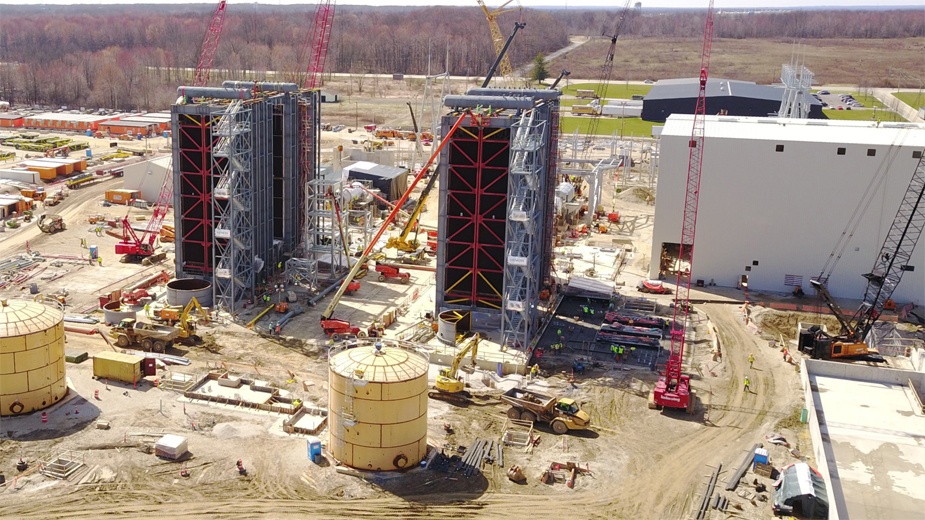Lawsuit Claims Investment Group is Delaying Second Power Plant
LORDSTOWN, Ohio – A Trumbull County Common Pleas Court judge has ruled that the company building the $900 million Lordstown Energy Center at the Lordstown Industrial Park must sign an addendum that would pave the way for the construction of a second electrical generation plant at the site.
Developer Clean Energy Future LLC filed a complaint in the Trumbull County Court of Common Pleas Sept. 20 claiming that the majority owners of the Lordstown Energy Center are blocking the progress of the Trumbull Energy Center by refusing to sign a consent form that would allow the project to move forward.
Judge Peter Kontos on Nov. 28 affirmed an earlier decision of magistrate Jami Bishop, who issued a preliminary injunction stating that the company – Clean Energy Future Lordstown – must sign the addendum and comply with the terms of an option to purchase agreement it signed with Clean Energy Future LLC in April of 2016, according to court papers.
Clean Energy Future Lordstown filed an appeal before the Eleventh Circuit Court on Nov. 30. That appeal was dismissed Dec. 29 on the merits that the case should move to a permanent injunction before an appeal could be heard.
“The vibe that I’m getting is that it’s probably going to be resolved over the next several weeks,” said Lordstown Mayor Arno Hill. Hill has praised the work of developer Clean Energy Future and its president, Bill Siderewicz, and is a strong proponent of both projects.
Massachusetts-based Clean Energy Future claims that the majority owner of the Lordstown Energy Center is holding up development of a second power plant at the site, placing that entire project in jeopardy, court papers say.
Clean Energy Future developed the Lordstown plant, and 70% of that project is now owned by Macquarie, an international equity firm. The energy plant is now under construction.
In order for it to be built, tenants in the Lordstown Industrial Park had to sign off on an earlier addendum that would override restrictions at the park and permit the construction of the Lordstown Plant. Clean Energy-Lordstown, which purchased the land, signed off on that addendum on March 28, 2016, court papers say.
Early last year, Clean Energy Future announced its intention to build another $900 million energy plant – the Trumbull Energy Center – on land that is now owned by the Clean Energy Lordstown group. Clean Energy Future signed an option to purchase agreement in April with Clean Energy Lordstown to acquire the property, and, according to court documents, the agreement stipulates that Clean Energy Lordstown would “reasonably assist in any capacity” to help Clean Energy Future facilitate its “intended use of the option property.”
However, the Macquarie group has refused to consent to another addendum that would clear the way for development of the second power plant, the filing claims. Without this consent, Clean Energy Future cannot obtain title insurance on the property where it intends to build the new plant, which is mandatory in order to secure financing for the project.
Failing to sign the addendum would thus jeopardize Clean Energy Future’s ability to line up financing for the Trumbull Energy Center and “threatens the very viability of the project,” court documents say. Should Macquarie balk at signing, Clean Energy’s only option would be to relocate the Trumbull Energy Center outside of the Lordstown Industrial Park, which would cause delays, added costs, modification of new permits and licenses, and create the “potential for a complete project failure,” the complaint reads.
Macquarie said in August that it would not sign the addendum because it wanted to conduct a study on how a second plant would impact the Lordstown electrical plant, according to documents. That study, court papers say, would take “at least two months.”
However, the appeals ruling last week notes that Clean Energy Lordstown asserted that it would suffer an average annual loss of $6.7 million between 2021 and 2036 should it be forced to comply with the court’s preliminary injunction, documents say. Further, the appeals court ruling states that there are other filings requesting an arbitrator and a permanent injunction in this matter. Therefore, Clean Energy Lordstown “will have an opportunity to litigate the merits of its defense to the request for permanent injunction with either an arbitrator or the trial court,” the judgment reads.
In October, the Ohio Power Siting Board approved the Trumbull Energy project. Like the Lordstown Energy Center, the Trumbull Energy energy plant would employ hundreds of local tradesmen during the construction phase.
Copyright 2024 The Business Journal, Youngstown, Ohio.


